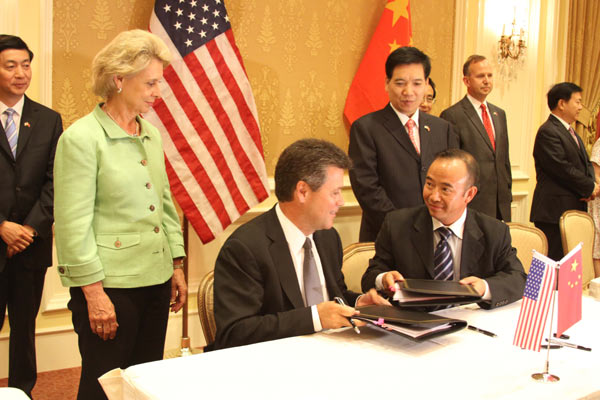Provincial governors sign deals in US
Updated: 2011-07-15 10:14
By Tan Yingzi (chinadaily.com.cn)
|
|||||||||
SALT LAKE CITY – All four Chinese provincial leaders participating in the first China-US Governors Forum witnessed on Thursday the signing of 20 agreements on trade, education, environmental protection, culture and people-to-people exchanges, in Utah capital.
 Peter D. Gibbons (third left), Starbucks executive vice president for global supply chain operations, and Liu Minghui, chairman of the board of Aini Group in Southwest China's Yunnan province, sign an agreement to create a coffee business partnership between their two companies.
[Photo/chinadaily.com.cn] |
East China's Zhejiang province and the state of Delaware have agreed to more friendly exchanges. The small- and medium-sized enterprises from the rich coastal province, which boasts the most active private sector in China, will work with the Department of International Trade and Development of Delaware to further explore more business opportunities in the United States.
The other three Chinese provinces focused more on green technology and environmental protection.
For example, Northwest China's Qinghai province, which is similar to the state of Utah in terms of geography, will work with Pacific Millennium Holdings Corp on the International Forum and Joint Development of Ecology and Carbon Sink of Qinghai.
Wuhu Economic and Technological Development Zone in East China's Anhui province reached a deal with NuvoSun on the thin film solar cells project.
Southwest China's Yunnan province, which has ample natural resources, is pioneering in environmental protection as it partners up with the US Nature Conservancy on bio-diversity protection.
Meanwhile, US coffee chain Starbucks Corp signed a Memorandum of Understanding with Ai Ni Group, one of Yunnan province's most established coffee operators and agricultural companies. The company announced last November that it would collaborate with the Yunnan Academy of Agricultural Science and the province's Pu'er city, to help local farmers promote sustainable coffee-growing practices and develop high-quality coffee locally.











